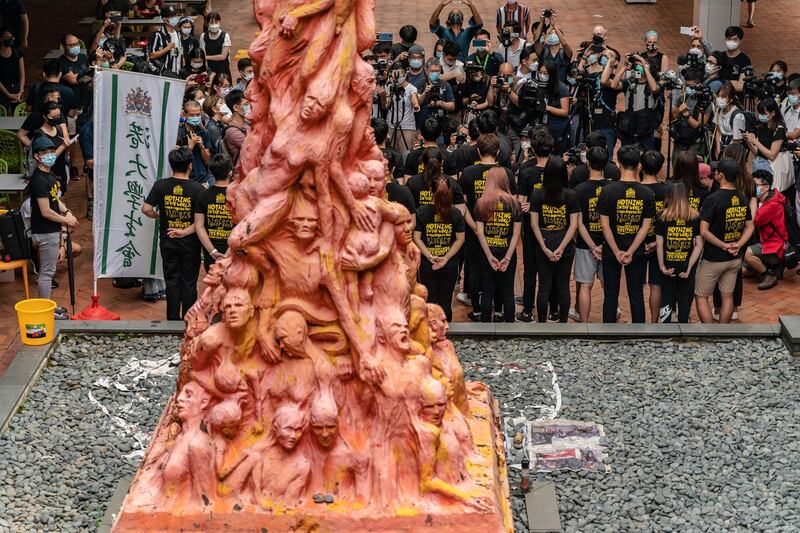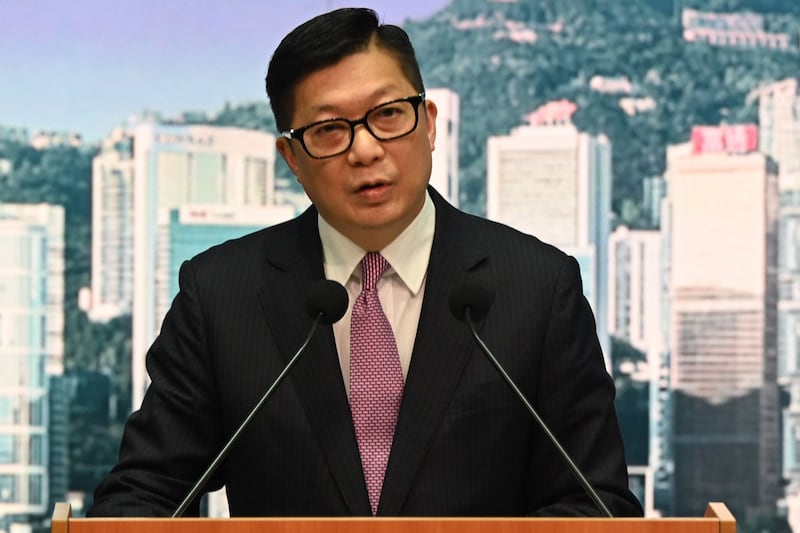Hong Kong's security chief has warned Danish sculptor Jens Galschiøt that artistic creations like his seized "Pillar of Shame,” which commemorates the 1989 Tiananmen Square massacre, can sometimes be a "pretext" for those seeking to "endanger national security."
The sculpture, which depicts a tower of human bodies, was seized in May as part of a national security investigation.
"It is a common modus operandi of those seeking to endanger national security to engage in such acts and activities under the pretexts of ‘peaceful advocacy,’ ‘artistic creations’ and so forth," Chris Tang wrote in a letter to Galschiøt dated Aug. 21, a copy of which was posted to the artist's website.
"Law enforcement authorities will conduct diligent investigations to ascertain if the true nature and substance of such acts and activities is to endanger national security, and the mere use of labels is of no avail," Tang warned.
The case is yet another example of China's clampdown on Hong Kong, where authorities have employed a highly elastic definition of what constitutes a threat to "national security."
Dozens of former opposition politicians and activists are standing trial for "subversion" for organizing a democratic primary election.
Arrest warrant?
However, Tang declined to answer Galschiøt's original enquiry, sent in a letter dated Aug. 11, in response to reports that police had issued a warrant for his arrest.
"Are there charges filed against me, and if so, what are they?" Galschiøt asked in that letter. "Has an arrest warrant been issued or is there a plan to issue one against me?"

To this, Tang replied only: "The Police will not respond to any enquiry in relation to individual cases. Rest assured that when the police arrest a person, he will be informed upon arrest [of] the offense for which he is arrested."
But he mentioned recent arrest warrants and bounties issued for eight prominent Hong Kong rights activists now living overseas, warning that the draconian security law applies to everyone in Hong Kong and abroad, whether they are a permanent resident of the city or not.
"The Police will not hesitate to take enforcement actions with a view to bringing any person who has violated the National Security Law to justice," Tang warned. "The recent actions taken by the Police against eight wanted persons who have fled overseas ... demonstrate the HKSAR Government's determination to discharge its constitutional duty."
Galschiøt had also asked to be updated about when the authorities would return the "Pillar of Shame" sculpture to him, but didn’t receive a clear answer.
"Seizure of any property or exhibit for criminal investigation or criminal proceedings in connection with offenses endangering national security is conducted by the law enforcement authorities in accordance with legal or judicial authorization,” Tang replied. “Any such property or exhibit seized will be handled and disposed of (if appropriate) in accordance with the law.”
He said freedom of expression was "not absolute," and could be subject to "necessary" restrictions in the pursuit of national security or public order.
Treated like criminals
Galschiøt expressed disappointment with Tang’s reply and said in a statement on his website that the Hong Kong government's move treats anyone engaged in artistic creation and peaceful advocacy in Hong Kong like criminals.
The response clearly showed that Hong Kong is moving away from democracy and towards a lawless dictatorship, he said, adding that he had to "read between the lines" for answers to his questions.

A report in the pro-China Sing Tao Daily newspaper had said Hong Kong police want to arrest Galschiøt, and that if he did come to Hong Kong to retrieve his artwork, he could be sent to face trial in mainland China under Article 55 of the law.
"They have decided to activate Article 55 of the Hong Kong National Security Law, meaning that the case will be handed over to [Beijing's] National Security Office in Hong Kong, which can exercise jurisdiction to transfer it to the mainland for trial," the paper said.
Article 55 of the law, which was imposed on Hong Kong from July 1, 2020, in a bid to crack down on the 2019 pro-democracy movement, allows for national security cases deemed to be of a "serious" nature to be transferred to mainland China for trial.
Tang claimed in a recent Facebook video that several waves of mass protests calling for democracy and the preservation of Hong Kong's promised freedoms were the work of "foreign forces" trying to foment a "color revolution" in Hong Kong.
"The intention of foreign forces to make use of Hong Kong to endanger our national security didn't happen overnight," Tang said in the video. "National security incidents have occurred repeatedly in Hong Kong over the past two decades."
Tang went on to blame the mass protest campaign in 2012 by students -- some of them still in secondary school -- against patriotic educationin Hong Kong's schools, the 2014 Occupy Centralmovement for fully democratic elections, the 2016 " fishball revolution" in Mong Kok and the 2019 movement against extraditionto mainland China on the actions of "foreign forces."
"Many young people had been radicalized," said Tang, who was chief of police during the 2019 protests. "External forces were up to the same old tricks again."
Translated by Luisetta Mudie. Edited by Malcolm Foster.
